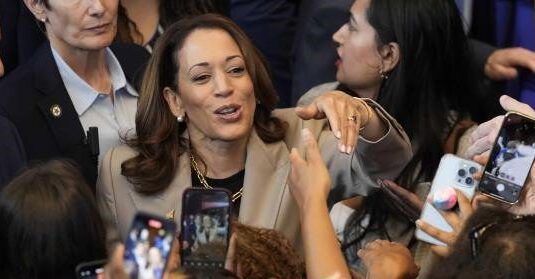BTN News: Kamala Harris, a name that has become synonymous with American politics, has shown a remarkable ability to evolve and adapt throughout her career. From her early days as the District Attorney of San Francisco to her current role as the Vice President of the United States, Harris has navigated the complex waters of public opinion, legal challenges, and political strategy with a blend of pragmatism and ambition. Her journey has been marked by a series of significant policy shifts, some of which have sparked criticism and raised questions about her core convictions. As she once again positions herself for a potential run at the presidency, these changes in stance may become focal points for both her supporters and detractors.
One of the most contentious aspects of Harris’s political journey is her stance on the death penalty. When she was elected as District Attorney of San Francisco in 2004, Harris made a bold declaration: she would never seek the death penalty. This promise was tested early in her tenure when a young gang member was charged with the murder of San Francisco Police Officer Isaac Espinoza. Despite immense pressure from law enforcement and political figures, Harris stood by her commitment, opting not to pursue the death penalty. This decision, framed by Harris as a moral choice, drew sharp criticism, particularly when Senator Dianne Feinstein, a fellow Democrat, publicly rebuked her stance at Espinoza’s funeral.
However, Harris’s position on the death penalty began to soften as she prepared for her campaign for California Attorney General in 2010. In a race against Steve Cooley, the Republican District Attorney of Los Angeles, Harris stated that she would enforce the death penalty as mandated by state law. This pivot was seen as a pragmatic move in a tightly contested election, and once in office, Harris’s team successfully defended the death penalty in court, emphasizing her duty to uphold the law, despite her personal reservations.
Harris’s tenure as Attorney General was marked by a similarly complex relationship with criminal justice issues. Initially known for her tough-on-crime stance, Harris prosecuted parents of truant children, pushed for higher bail amounts, and aggressively pursued drug-related offenses. These actions earned her the nickname “Copala,” a play on her first name, reflecting her hardline approach. Yet, as her political aspirations grew, so did her policy positions. By the time she reached the U.S. Senate in 2016, Harris had shifted toward a more progressive platform, advocating for criminal justice reforms such as the abolition of cash bail, a position her office had defended just months prior.
Another area where Harris has demonstrated significant policy shifts is in her approach to marijuana legalization and gun control. As District Attorney, Harris’s office convicted nearly 2,000 people for marijuana-related offenses, and she opposed the legalization of recreational marijuana in California as late as 2010. However, by the time she launched her 2019 presidential campaign, Harris had transformed into a vocal advocate for the legalization of cannabis, even humorously admitting to having smoked marijuana during her college years. Similarly, Harris’s stance on gun control has evolved. While she once supported mandatory gun buyback programs, a controversial policy even among Democrats, her focus as Vice President has shifted to more widely accepted measures such as universal background checks and “red flag” laws.
Harris’s policy recalibrations are not uncommon in the political arena, where shifting public opinion and the demands of higher office often necessitate changes in stance. However, these shifts have also exposed her to criticism, particularly from those who view consistency as a hallmark of trustworthy leadership. The question remains: do these changes reflect a genuine evolution of beliefs, or are they merely strategic moves designed to align with the prevailing winds of political necessity?
As Harris takes on an increasingly prominent role in the Democratic Party, especially with the departure of President Joe Biden from the 2024 presidential race, her past decisions will undoubtedly come under intense scrutiny. The Republican Party is likely to seize on her shifts in policy to question her authenticity and conviction, much like they did with past Democratic candidates who faced similar accusations of flip-flopping.
Yet, it is essential to consider that Kamala Harris’s political journey mirrors the broader trajectory of American politics, where adaptability and the ability to respond to changing societal values are often necessary for survival. While her critics may view her shifts as opportunistic, her supporters could argue that they demonstrate a willingness to grow and respond to the evolving needs of the American people.
In the end, Harris’s legacy may well depend on how she balances these past shifts with the future vision she presents to the electorate. Whether she can effectively communicate the reasons behind her policy evolutions and convince voters of her steadfast commitment to their well-being will be crucial in determining her political future. As the nation watches closely, Harris’s ability to navigate the complex landscape of American politics will continue to be tested, and her responses will shape not only her career but also the broader trajectory of the Democratic Party.


